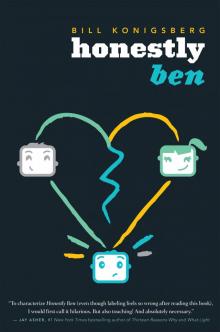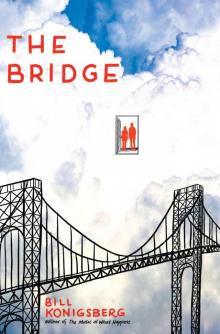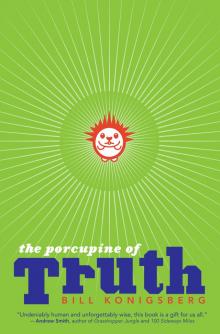- Home
- Bill Konigsberg
The Bridge Page 3
The Bridge Read online
Page 3
Walking to homeroom, he passes the Avenue Q sign and sees no cast list, still, which sucks. Then he spies a sign-up sheet for the talent show two weeks from Saturday. He stops and stares at it. He cracks up and rolls his eyes. Right. You people can’t even be bothered to listen to one song when I send it to you. I’m not wasting my—
A second thought trips over the first. But they didn’t even hear it. There were so few clicks, so it’s not like people rejected it. They just didn’t listen.
And then, as he stands there, staring at the Sharpie hanging from a string attached to the bottom of the sign-up sheet with a blue thumbtack, he has a fantasy. He’s onstage, performing “Walking Alone.” The rapt attention as he gets to the chorus: Taking walks all alone, because I can’t be with you … and his eyes meet Evan Hanson’s, and they have a moment, a thing where the curtain rises between two people and there’s that heart shimmy that happens when someone sees him, really sees him, and he hears Evan’s voice: You, Aaron Boroff. You have layers. You’re so much more than they know. Is the you in the song … me? Could it be, please? And Aaron smiles dopily, because he knows it’s just a fantasy but it’s a scrumptious fantasy nonetheless, and that’s enough to make him add his name to the list.
Molly Tobin’s mom cancels her Pilates class to hang with her.
“You okay, darling?” her mom asks, sitting at Molly’s bedside.
Molly stares at her with red-rimmed eyes. There’s oblivious and then there’s oblivious.
The girl she got suspended for making fun of, her old best friend from sixth grade, just jumped off a bridge. Committed suicide. She’s dead.
Safe to say Molly is not exactly okay.
A few blocks north, at Browning School, a boy sits on the stage in the theater, in the dark, stunned. He was going to text her. Today. Why oh why did he have to wait? Why?
When his buddy Mike sent the link—Is this her???—Amir Rahimi was in English class.
Mike had been there when Amir met Tillie. All Mike knows is the few details Amir shared: that she fell for Amir and then he jetted.
Amir’s story is more than that. Way more.
And yes, it was her. He clicked on the link and promptly ran out of class. He made it to within five feet of the bathroom before spewing vomit all over the floor. Then he looked both ways, saw he was alone in the hallway, and ran off to the theater, where he could be alone with his overwhelming shock and shame.
He had been intending to make things right. He had just been waiting for the right time. For the jitteriness to subside. So he could be real with her. Why couldn’t she have given him one more day?
Sometimes ghosting isn’t ghosting, he thinks, sitting there, his forehead resting in his palms. Sometimes what seems like an aggressive move to get rid of someone, actively ignore them, is something else entirely.
But the other person. They don’t know that.
And that’s the shittiest part of it all.
As soon as he gets to the hospital for his rotation, an unsettled feeling creeps into Michael Boroff’s gut.
“Are you feeling sad?” he asked his son, knowing the answer already. Aaron thought he was a better actor than he really was.
Michael calls his warrior brother Morris.
“You have a few minutes?” he asks, ducking into a supply closet. “Need to check in on something.”
“Just doing my morning sudoku,” Morris says. “What’s up?”
“I can’t get Aaron to talk. I can’t get him to say anything. He’s freezing me out.”
“I hear that,” Morris says. “What’s the feeling?”
As much as the warrior speak helped him, sometimes it makes him a little homicidal.
“It feels fucking shitty!” he answers testily.
“Good awareness.” Morris remains calm. “Say more about that.”
And Michael allows himself to yell it out. “I have no control! It feels like I’m driving blind and I fucking hate it!”
The two men breathe together for a bit. And soon Michael feels better. Not good, but better. He laughs. Morris laughs, too.
“Yeah,” Morris says. “Thank you. I believe that.”
A calmness overcomes Michael. His heart is open. Thank God for that. For years, the world of finance had closed it. Not feeling things almost killed him. He hadn’t even known. And now. Not easy. Not easy almost ever. But so much better. So much more real.
“Thank you,” Michael says. “And thank you for not giving me advice. Because if you had given me advice, I would have hunted you down and killed you.”
Morris laughs. “Wow. Aggressive.”
The men both laugh.
“Thanks,” Michael says again, his voice much softer now. “Thanks for holding space.”
“No problem, brother.”
In creative writing class, it’s Aaron’s day to be critiqued. On the positive side, that means he didn’t neglect to read someone else’s story last night. On the negative, he hasn’t written anything new. Luckily, he has something ready to go because he’s Aaron and of course he does, so he emails it around so they can follow along and he starts to get that jittery feeling in his throat that comes when he’s about to be the center of attention, because he loves loves loves that and he’ll never ever ever tell a soul just how much he loves it.
While everyone is opening the file, Ms. Hooper smiles at him and strolls over to his front-row desk. She points at him with a wiggle of her finger.
“I really loved that song,” she says. “Wow.”
Aaron feels his face heat up. Mystery solved on one of the two other listeners. “Um, thanks. I know it’s kind of bad.”
“Not at all. It’s the opposite. I love how you emote in your songs. It’s such a good outlet for you.”
Aaron swallows. He knows this isn’t what gets said to future music legends, necessarily, but he’s too tired to focus there, so he smiles again and focuses on the wow.
“Thanks.”
He reads his piece, which is a change-of-pace story for him. Pretty much everything he writes is from his life, thinly veiled versions of things that had happened to him or were on his mind. Like when he wrote about a kid who was scared to come out. It said what he couldn’t, and everybody was really supportive and three girls came up after and gave him a hug and said he should sit with them at lunch. The lunchtime arrangement lasted only a couple days, but he was always grateful for how the kids in the class had rallied by his side. And he came out shortly after, so that was good.
Today’s piece, though, is more funny. He does dialogue straight from his weirdo social-worker-in-training, men’s-group-going dad, and then he gives a pretty random but amusing inner monologue from the subway. A friend makes an offhanded joke that Aaron considers really weird, and he thinks, in response, What are you, autistic?
When the story is done and the critique starts, Staci Raimey raises her hand.
“I just think it’s interesting that Aaron asks for total support and acceptance of his gayness,” she says, twirling her frizzy brown hair around her finger, “but, like, autism is funny to him.”
He isn’t supposed to speak during the workshop, but this catches him off guard.
“What?” he asks. It was a throwaway line. He didn’t mean anything by it. “I—”
Ms. Hooper shushes him. “No talking when it’s your story being critiqued.”
“That was super offensive,” Staci says. “Using autistic like it’s something bad.”
Aaron knows he made a dumb mistake. He’d written it without thinking, and when Kwan talks about how mean people are to his brother, who has Asperger’s, and how words really can hurt people, and that Aaron should know that, a little bit of him dies inside.
He walks to Spanish feeling like the worst person in the world. Which he is. Because he’s been mean, and him being mean indicates that he must have abandoned himself, lost himself somewhere, because nothing about Aaron has ever really been mean, and it isn’t acceptable to him to think of hims
elf as a hurter rather than a hurtee, as someone who lets a girl jump off a bridge instead of someone who jumps himself. Ms. Higuera asks him cómo está, and Aaron says bien, but he’s anything but bien, and he hears almost nothing the rest of class.
He sits alone at lunch, a dark fog settling over him, thoughts reaching low into an abyss that reminds him of the bridge yesterday. How can feelings actually hurt his body? But they do. They push out against his rib cage like an expanding devil bubble, and he finds it’s hard to breathe.
Kwan puts his tray down and says, “Can I sit here?”
Aaron nods and says “sure” softly. It’s all the voice he has at the moment.
Kwan waves, and suddenly Ratiya Song and Ebony McClendon and Josh Porter join them, and dread seeps into Aaron’s chest. He’s not gonna be able to handle whatever’s coming. Not by a long shot.
“So in diversity club,” Ratiya says, “we have this ouch/oops policy.”
“Yeah,” says Ebony. “When you microaggress, a person interrupts and says, ‘Ouch.’ And then they explain why they said it, and then the microaggressor has a chance to say, ‘Oops,’ and make things right.”
“Oops,” Aaron says to the table in front of him, avoiding everyone’s eyes because he’s afraid if he looks at them they’ll see that he’s just about through. With life. With everything. Everything feels tight. They don’t know, and it’s not something you can tell people. That they should be kind to a microaggressor because he almost jumped off a bridge the day before and is feeling kinda jumpy again. It’s not a thing you say, and he doesn’t deserve it anyway.
As his classmates talk him through it, Aaron nods and nods and nods and says sorry, sorry, sorry until they finally go away, which is about a minute after he feels his system failing, like a computer spinning, spinning until you have to just shut it down, and his head is buzzing and things feel out of perspective, like the walls in the hall tilt slightly to the left and his feet feel like they might stumble on the uneven floor beneath him.
He finds himself avoiding the eyes of everyone in the dizzy-making, skewed hallway, sure word has gotten out that he wrote something hurtful and that everyone is talking about it. If he’d jumped yesterday, people would be saying nice things about him, but instead he’s still alive and everyone hates hates hates him and what in the world are they saying in the hallways at Spence about Tillie, and it’s probably mostly nice, and could he get that without the dying part, could he just get everyone to be nice even when he’s bad, even when he’s wrong.
Tillie, is it better where you are? Are you finally at peace? Was it worth it? Did it work?
In physics class, he struggles to pay attention, and the difference between centripetal and centrifugal goes right through him and he feels it not landing, and he realizes he doesn’t actually care anymore. It just goes through him. And when the bell rings, the funniest thing ever happens.
He doesn’t move.
Aaron is staring at the whiteboard. A crack in the upper-left quadrant that is almost a diagonal line, almost leading toward the top-left corner, but not quite. It’s imperfect and random.
“Aaron?” Dr. Sengupta says from the front of the classroom. It may be empty, it may be emptying. Aaron doesn’t know. He cannot move his head.
Hmm, he thinks. This is new. This is interesting. Aaron likes new and interesting, but not this new and interesting in particular. It’s petrifying because he literally cannot move and if he had feelings left he would feel deeply scared. But feelings are gone.
“Aaron?” Dr. Sengupta repeats, and it’s as if Aaron is watching a movie but not seeing it. He knows there’s a classroom, and he’s in it, but he can’t quite see the scene, and his mind tells him, It might be good for you to stand now and walk out of the classroom, because there will be repercussions—but that’s not a choice he has. He can’t. Move.
The next fifteen minutes are notable in that he is aware that a class is not starting, despite the bell. Something, someone, must be keeping the kids out of the classroom. Sengupta and the Nameless They were talking to him and then not talking to him, trying to roust him and then accepting the unmovable object that is Aaron Boroff, who is so, so weird, and this will not help his reputation but also, again, he doesn’t care anymore. He can’t.
The stretcher feels new. A new form of transport from the physics room. And as he’s carried out as a sort of problematic Egyptian king, the thought he has is that he’d better not come to right now, because probably nothing would be more alarming to him than what is happening right at the moment, except it’s not quite happening to him, is it? It’s the idea of an event, happening to someone else. His brain is cushioned by white cloud. His eyes are very much open but unseeing. His ears are swathed with a puff of toilet tissue from the inside, clogging up the canal.
The ambulance is.
The hospital hallway, too. Is.
Is. Is. Is. Time undulates, goes copper. Then silver-white.
The questions the doctor asks are not for him and it seems from the tone of what he can hear that this is understood, much like an agreement in math, when it’s understood that X is a positive integer, perhaps. Solve for Y. He is Y. Someone is there with him, and the presence of this person is a color, off blue, like a grayish version that dulls at the corners and will never take anyone to prom. No one likes this blue or invites it to hang out in front of the Museum of Natural History on Friday nights.
Is Topher? Is Sengupta? Is the assistant principal? Who has a name, too? They?
Dad?
CHAPTER 3A: APRIL 19
“So I heard you had quite a day yesterday,” Dr. Laudner says.
Aaron nods, but he’s elsewhere. Not elsewhere like yesterday, when he really wasn’t present. More like contemplative, tired. He’s sitting in a small, faded, gray-walled office that is packed with ferns, as if this dude should have gone into horticulture and started a greenhouse rather than becoming a shrink. The doctor, a tall, lanky middle-aged guy with a well-trimmed blond beard, sits across the room in a high-backed beige leather chair, taking Aaron in with a look that is not unkind.
For Aaron, it feels like he’s taken a vacation from his life. Like by not going to school on a Friday, and having his dad take the day off, too, it’s as if it’s summer break without the heat. He’s stepped outside the bounds of what is usual and it feels a bit like the end of the world. And he’s not sure it will ever feel any better, ever again.
“Aaron?” Dr. Laudner says.
“Sorry.”
“So the last couple days. Tell me about them.”
Aaron goes through the experience as best he can, and it’s all so exhausting to relive. He leaves out the part about Tillie; that’s not something he’s up for sharing. He finds that when he gets to the part where he’s carried out of the classroom on a stretcher, he has to pause. Not because he’s going to cry; he’s far too numb for that. It’s more that he’s so, so tired. Of talking. Of everything.
Thankfully, Dr. Laudner doesn’t push. They just sit there in silence for a bit, and then the doctor grabs a clipboard from his desk and hands it to Aaron.
“How about if we just have you fill this out,” he says, and at that moment Aaron decides he likes Dr. Laudner.
The doctor hands him a questionnaire. There are eighteen questions, and each has six multiple choice responses: Not at All, Just a Little, Somewhat, Moderately, Quite a Lot, or Very Much. If he weren’t nearly comatose, he knows he’d probably find the British-sounding responses charming. Instead, he just stares for a bit and then gets to work.
It’s not hard to answer the first. He realizes he’s been staring at the statement I do things slowly for a long time, so that one gets an easy Very Much.
Does his future seem hopeless? What future? Check. Very Much.
Has the pleasure and joy gone out of his life? Check. If there ever was any, it’s now totally gone. Very Much.
He stares at the column of Very Much, and suddenly the word Much looks like it’s misspelled,
or not a word, or it’s lost its meaning.
The eighth question is the first one that doesn’t get a Very Much. I am agitated and keep moving around. Um, no. Not at All.
But the rest are all Very Much, and when he gets to fifteen, which asks if he spends a lot of time thinking about how he might kill himself, his hand starts shaking and he overfills the circle. Very Much.
In the end, he has fifteen Very Much, one Quite a Lot, one Moderately, and one Not at All. He motions the clipboard at Dr. Laudner, who jumps up and collects it. He then sits down and scores it with a blue pen.
When he’s done, he looks up at Aaron. “So you scored an eighty-two,” he says.
Aaron asks, “Is that good?”
“Zero to nine is not depressed. Anything over fifty-four is severely depressed.”
“Just like me to pick the worst time to get a B-minus.”
This makes Dr. Laudner laugh, Quite a Lot, and Aaron, despite himself, perks up Just a Little.
“So let’s talk,” the doctor says, and Aaron tells a little bit. How he felt going up to the bridge and deciding not to jump. And about his dad sobbing in the hospital, when he heard, and how that made Aaron feel like the worst person in the world. Super Guilty. And all the background of his life. Just the facts, ma’am. His dad and his mom. The divorce when he was eight, which multiplied his holiday presents by two, basically. Living with Dad ten months a year, visits to Mom during the summer and over Christmas, which makes sense since she’s Christian and Dad is Jewish. The doctor nods at all the right places, and Aaron finds that he’s pretty comfortable, actually. For a guy who went, like, full-on catatonic a day earlier, for a guy who just aced the severely depressed test, just talking feels okay, like a warm sweater and a log on the fireplace at his mom’s place in Sandwich, writing a song or maybe a funny short story. Hygge. Which is a word his dad taught him.

 Honestly Ben
Honestly Ben Openly Straight
Openly Straight The Bridge
The Bridge The Porcupine of Truth
The Porcupine of Truth